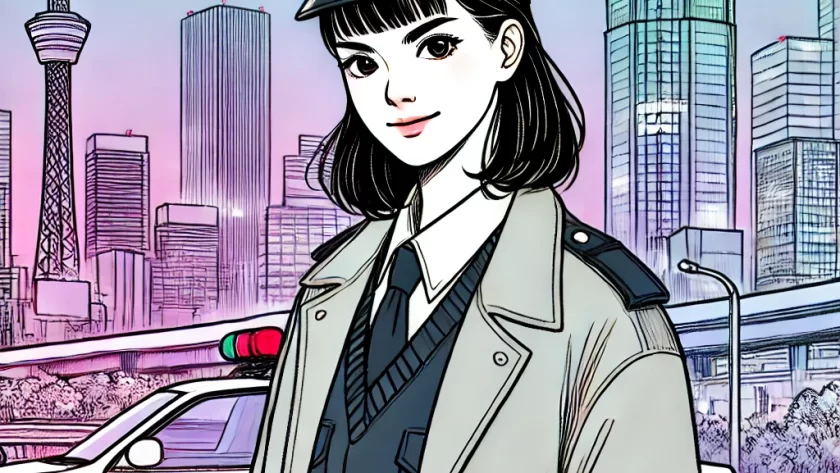ペッパー警部 [Peppā Keibu]
ピンク・レディー [Pinku Redī]
Words : 阿久悠 [AKU Yū]
Music : 都倉俊一 [TOKURA Shun’ichi]
Pink Lady is a female pop music duo from Shizuoka wiki. They are representative “Idols” (see also “Idol“). The members are Mī (Mie) and Kei. After debuting on the audition TV program “Sutā Tanjō!” (=A Star Is Born!), they released many hit songs with innovative choreography and costumes, creating an explosive boom. In their later years, they expanded to the United States, and “Kiss In The Dark” became a hit, reaching 37th on the Billboard chart. This was a great achievement since Kyu Sakamoto‘s “Sukiyaki,” but it is not well-known in Japan. Despite its short-lived success, a TV show called Pink Lady was created.
Today, I introduce their debut single, “ペッパー警部 / Peppā Keibu”. “Keibu” is a rank in the Japanese police force, equivalent to captain or chief inspector overseas. Lyricist Yū Aku mentioned that he might have been inspired by Inspector Clouseau from “Pink Panther” and the Beatles’ album “Sgt. Pepper’s Lonely Hearts Club Band.”
ペッパー警部 邪魔をしないで
peppā keibu jama o shinaide
ペッパー警部 私たちこれからいいところ
peppā keibu watashitachi korekara ī tokoro
- 邪魔をする(じゃまをする) [jama o suru] : interfere
- 私(わたし) [watashi] : I
- たち [tachi] : plural suffix
- これから [korekara] : from now
- いい [ii] : good
- ところ [tokoro] : place, part
(translation) “Inspector Pepper, don’t interfere.
Inspector Pepper, we’re just getting to the good part.”
In movies or dramas, the most exciting part is called “いいところ / ii tokoro” (=the good part). If you don’t want someone to turn off the TV, you can say “邪魔をしないで / jama o shinaide” (=don’t interfere) and “これからいいところ / korekara ii tokoro” (=we’re just getting to the good part) just like in these lyrics.

“わたし / watashi” is “I,” and “わたしたち / watashi-tachi” is its plural form “we.”
Here, you can imagine a couple on a date.
あなたの言葉が 注射のように
anata no kotoba ga chūsha no yō ni
私のこころにしみている ああ きいている
watashi no kokoro ni shimite iru ā kiite iru
- あなた(あなた) [anata] : you
- 言葉(ことば) [kotoba] : words
- 注射(ちゅうしゃ) [chūsha] : injection
- のように(のように) [no yō ni] : like
- 心(こころ) [kokoro] : heart
- しみる(しみる) [shimiru] : soak, penetrate
- 効く(きく) [kiku] : effective, work
(translation) “Your words are like an injection,
soaking into my heart. Ah, they’re working.”
“ている / te iru” is like the English “-ing” form. “しみる / shimiru” (=soak) changes to “しみている / shimite iru” (=soaking), and “効く / kiku” (=work) changes to “効いている / kiite iru” (=working). Japanese verbs have many forms, so it’s necessary to study them.
In this blog, I don’t explain grammar much, and I hope you will just learn the words that interest you.
むらさきいろした たそがれ時が
murasaki iro shita tasogare doki ga
グラビアみたいに見えている ああ 感じてる
gurabia mitai ni miete iru ā kanjiteru
- 紫色(むらさきいろ) [murasaki iro] : purple
- たそがれ時(たそがれどき) [tasogare toki] : twilight
- グラビア(ぐらびあ) [gurabia] : gravure, photo shoot
- みたい [mitai] : like
- 見える(みえる) [mieru] : see
- 感じる(かんじる) [kanjiru] : feel
(translation) “The purple twilight
looks like a gravure photo shoot. Ah, I feel it.”
その時なの もしもし君たち帰りなさいと
sono toki nano moshimoshi kimitachi kaerinasai to
二人をひきさく声がしたのよアアア
futari o hikisaku koe ga shita no yo āāā
- その [sono] : that
- 時(とき) [toki] : time
- もしもし [moshimoshi] : hello
- 君(きみ) [kimi] : you
- 帰る(かえる) [kaeru] : return
- 二人(ふたり) [futari] : two people
- 引き裂く(ひきさく) [hikisaku] : tear apart
- 声(こえ) [koe] : voice
(translation) “At that time, ‘Hello, you two, go home,’
a voice that tore us apart shouted.”
“もしもし / moshimoshi” is a standard word used to call someone or as the first word when answering the phone.
“君 / kimi” means “you.” In lyrics, it is often used by men to address women, but originally it was used by people of higher status to those of lower status. In the past, men were more authoritative than women, and police officers were more authoritative than they are today.
By the way, police officers of the rank of inspectors do not conduct street interrogations.

ペッパー警部 邪魔をしないで
peppā keibu jama o shinaide
ペッパー警部 私たちこれからいいところ
peppā keibu watashitachi korekara ī tokoro
愛しているよと 連発銃が
aishite iru yo to renpatsu jū ga
私を殺してしまいそう ああ 負けそうよ
watashi o koroshite shimaisō ā makesō yo
- 愛している(あいしている) [aishite iru] : love
- 連発(れんぱつ) [renpatsu] : rapid-fire
- 銃(じゅう) [jū] : gun
- 殺す(ころす) [korosu] : kill
- 負ける(まける) [makeru] : lose
(translation) “Saying ‘I love you,’ the rapid-fire gun
seems to be killing me. Ah, I feel like I’m losing.”
都会の空では 奇跡のような
tokai no sora dewa kiseki no yō na
星空ひろがる夏の夜 ああ 夢みたい
hoshizora hirogaru natsu no yoru ā yume mitai
- 都会(とかい) [tokai] : city
- 空(そら) [sora] : sky
- 奇跡(きせき) [kiseki] : miracle
- のよう [no yō] : like
- 星空(ほしぞら) [hoshizora] : starry sky
- ひらがる [hiragaru] : spread
- 夏(なつ) [natsu] : summer
- 夜(よる) [yoru] : night
- 夢(ゆめ) [yume] : dream
- みたい [mitai] : like
(translation) “In the city sky, a miraculous
starry sky spreads on a summer night. Ah, it’s like a dream.”
その時なの もしもし君たち帰りなさいと
sono toki nano moshimoshi kimitachi kaerinasai to
夢からうつつに戻されたのよアアア
yume kara utsutsu ni modosareta no yo āāā
- うつつ [utsutsu] : reality
- 戻す(もどす) [modosu] : return
(translation) “At that time, ‘Hello, you two, go home,’
we were brought back from the dream to reality.”
ペッパー警部 邪魔をしないで
peppā keibu jama o shinaide
ペッパー警部 私たちこれからいいところ
peppā keibu watashitachi korekara ī tokoro
Please watch their performance from that time.
There were criticisms of their choreography, such as opening legs in a miniskirt is not graceful, but lyricist Yū Aku and composer Shun’ichi Tokura resisted and insisted on keeping it. From then on, Pink Lady continued to release hit songs with this coquettish style.
Thanks for reading! Feel free to comment if you have any feedback or questions.
Follow me on X.



